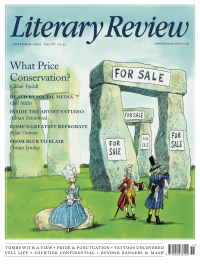Mark Almond
Back to the Balkans
My Family and Other Enemies: Life and Travels in Croatia’s Hinterland
By Mary Novakovich
Bradt 280pp £9.99
Try explaining to British readers, who, by dint of birth, might consider themselves to have won what Cecil Rhodes called ‘first prize in the lottery of life’, what it is like to be descended from someone on the losing side in a series of Balkan wars. That’s what the Canadian travel writer Mary Novakovich sets out to do here as she explores her family’s history and returns to the scene of the mayhem. It is a story of discovering the complexity of a past that seemed so simple from three thousand miles away. It is also a reflection on how, in a mere thirty or forty years, perspectives can change.
In 1941, the Nazi Blitzkrieg turned her Serb family, who lived in the Krajina region straddling Croatia and Bosnia, into an endangered species. In Yugoslavia, the Second World War was a multilayered conflict involving Croat nationalists, Serb royalists and partisans, and the Axis powers. On the back of the German invasion, the so-called Independent State of Croatia came into existence, incorporating the part of Yugoslavia where Novakovich’s family lived. They found themselves under the rule of the pro-Nazi, Croatian nationalist Ustaše movement.
Grisly wartime massacres, as well as the hair’s-breadth survival of her parents and a few other relatives, form the background to Novakovich’s exploration of where her family came from and what it went through. The ‘lucky’ ones went into exile, her parents ending up in Canada.
At the start of the book we meet Novakovich as a teenage ‘brat’ (her term) visiting Tito’s Yugoslavia alone in 1976. There she finds an extended clan whose language is very different from the odd bits of Serbian she has picked up at home and whose traditional cooking is

Sign Up to our newsletter
Receive free articles, highlights from the archive, news, details of prizes, and much more.@Lit_Review
Follow Literary Review on Twitter
Twitter Feed
It wasn’t until 1825 that Pepys’s diary became available for the first time. How it was eventually decrypted and published is a story of subterfuge and duplicity.
Kate Loveman tells the tale.
Kate Loveman - Publishing Pepys
Kate Loveman: Publishing Pepys
literaryreview.co.uk
Arthur Christopher Benson was a pillar of the Edwardian establishment. He was supremely well connected. As his newly published diaries reveal, he was also riotously indiscreet.
Piers Brendon compares Benson’s journals to others from the 20th century.
Piers Brendon - Land of Dopes & Tories
Piers Brendon: Land of Dopes & Tories - The Benson Diaries: Selections from the Diary of Arthur Christopher Benson by Eamon Duffy & Ronald Hyam (edd)
literaryreview.co.uk
Of the siblings Gwen and Augustus John, it is Augustus who has commanded most attention from collectors and connoisseurs.
Was he really the finer artist, asks Tanya Harrod, or is it time Gwen emerged from her brother’s shadow?
Tanya Harrod - Cut from the Same Canvas
Tanya Harrod: Cut from the Same Canvas - Artists, Siblings, Visionaries: The Lives and Loves of Gwen and Augustus John by Judith Mackrell
literaryreview.co.uk